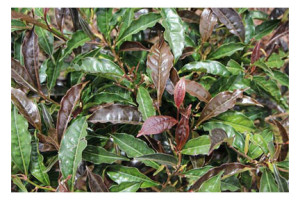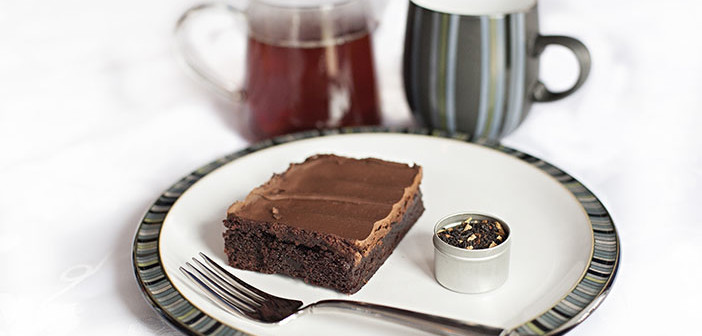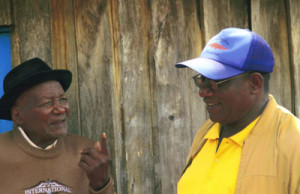“Slow down and have a cup of tea, and really accept yourself, your heart, your emotions, before you make decisions. A cup of tea is always the best to do that.” Joy W’Nijuguna, Founder, Royal Tea of Kenya
Vibrant Kenya is home to wildlife, rivers, mountains and more than 100,000 hectares of brilliantly hued tea. Grown mainly in the Kenyan highlands, near the Rift valley, tea is one of Kenya’s primary exports. The majority of tea in Kenya is grown at altitudes of 5,000 to 9,000 feet. Jane Nyambura, Program Coordinator at The Ethical Tea Partnership (ETP) said that lower temperatures in this area are ideal for growing tea as it inhibits insect infestations, making pesticide use almost unnecessary. The Rift region averages a daily low of 62-degrees.
Kenya continues to be the top exporter by volume of black tea worldwide. A critical aspect of the Kenyan tea story is its smallholder tea farmers, who produce more than 60% of Kenya’s tea.
 There are approximately 560,000 smallholder farmers in Kenya where the average farm is 1.2 acres (half a hectare). These farmers dedicate their lives to tea with the average farmer allocating 90% of their land to tea production. The remainder is used for food, perhaps a small vegetable garden and some livestock. The land is usually kept within the family, passed on from generation to generation, as the father subdivides the property among his sons. This is one cultural practice that ETP is trying to change, said Nyambura. Encouraging farmers to run one larger farm as a family is more efficient than subdividing it among family members.
There are approximately 560,000 smallholder farmers in Kenya where the average farm is 1.2 acres (half a hectare). These farmers dedicate their lives to tea with the average farmer allocating 90% of their land to tea production. The remainder is used for food, perhaps a small vegetable garden and some livestock. The land is usually kept within the family, passed on from generation to generation, as the father subdivides the property among his sons. This is one cultural practice that ETP is trying to change, said Nyambura. Encouraging farmers to run one larger farm as a family is more efficient than subdividing it among family members.
The impacts of climate change have been felt in Kenya, particularly in 2009, when a drought in the Rift area led to a 30% reduction in total production. To increase the smallholders’ resilience to the potential impacts of climate change, the ETP and German Development Agency GIZ launched a project from 2010 to 2013. As part of this project, farmers were taught crop management practices like planting shade trees, using drought resistant clones and installing rain water harvesting and drip irrigation systems.
Tea to the Kenyan Household:
Tea for several thousands of Kenyans means practically everything. It’s their primary income, their history, and an integral part of their lives. When you visit a Kenyan home, it’s likely you will be served a cup of tea, according to Joy W’Nijuguna, founder Royal Tea of Kenya. Tea is a common part of Kenyan life, consumed throughout the day and at every meal.
“I have a memory of my aunt, who showed me how to make this tea, and it tastes like vanilla,” says W’Nijuguna. “And you don’t let the tea steep in the milk for a long time, just pour it in, wait maybe three, four secs and then take it out, it is very milky tea.” The majority of Kenyans prefer to drink their black tea with a lot of milk; although specialty cafés are slowly introducing the Kenyan palate to green and white teas.
Due to the amount of milk used, very little black tea is required. According to Nyambura; Kenyans only drink about 5% of the locally produced tea. The remainder is exported. As an incentive to increase the overall value of their black tea, ETP encourages more “at home” tea consumption. They are also hoping to increase both the value and demand for Kenyan black tea internationally.
Tea in Kenya is harvested all year round. Farmers are paid bonuses based on the world market; notes W’Nijuguna. She is also the granddaughter of the oldest Kenyan tea farmer, Arthur Nijuguna Komo. “Because of the auction and supply and demand, sometimes, particularly this year, the true value of the tea is not being paid,” she says. “The small scale farmers suffer from that.”
Kenyan tea is often praised for its rich color and bolder notes but the high volume of tea in the market has lessened its value. In addition, at least 90% of the tea leaves are shredded in a process known as cut, tear and curl (CTC). CTC tea is most often used in tea bags. It brews faster than orthodox teas which are often hand rolled. Many CTC teas do not allow the consumer to taste the full depth of flavor within the tea.
There is so much CTC tea in Kenya that it is now undervalued. It’s for this reason that the Kenya Tea Development Agency (KTDA) has focused on developing a specialty orthodox tea market in Kenya. Adding orthodox tea production to a small-scale farm is also a process ETP has been encouraging to enhance the livelihood of these small-scale farmers. These teas include black, green, white and purple tea.
Diversifying the Portfolio: Orthodox Production
 In 2011 Tea Research Foundation of Kenya (TRFK) released purple tea, a clone that took 25 years to develop, as a way to diversify the tea portfolio of Kenya and promote orthodox tea production. The tea is drought-resistant, and this was initially the quality that drew the TRFK to purple tea.
In 2011 Tea Research Foundation of Kenya (TRFK) released purple tea, a clone that took 25 years to develop, as a way to diversify the tea portfolio of Kenya and promote orthodox tea production. The tea is drought-resistant, and this was initially the quality that drew the TRFK to purple tea.
One expert of the African tea industry and its unique attributes is David Walker, President, Walker Tea Corporation, New York. Walker has worked in the African tea industry since 1965. Today he acts as a consultant, creating specialty teas and directly introducing suppliers and buyers to each other. Walker observed that, in the last 10 to 15 years, Kenya has embraced the specialty market. Through the management of the KTDA, Kenya has become a producer of high quality black, white, oolong, green and even purple teas, he said.
Sources
Tea Research Foundation of Kenya
Interviews with:
Ethical Tea Partnership: Jane Nyambura
Royal Tea of Kenya: Joy Nyambura
If you liked this story, click here for another we think you’ll enjoy.





